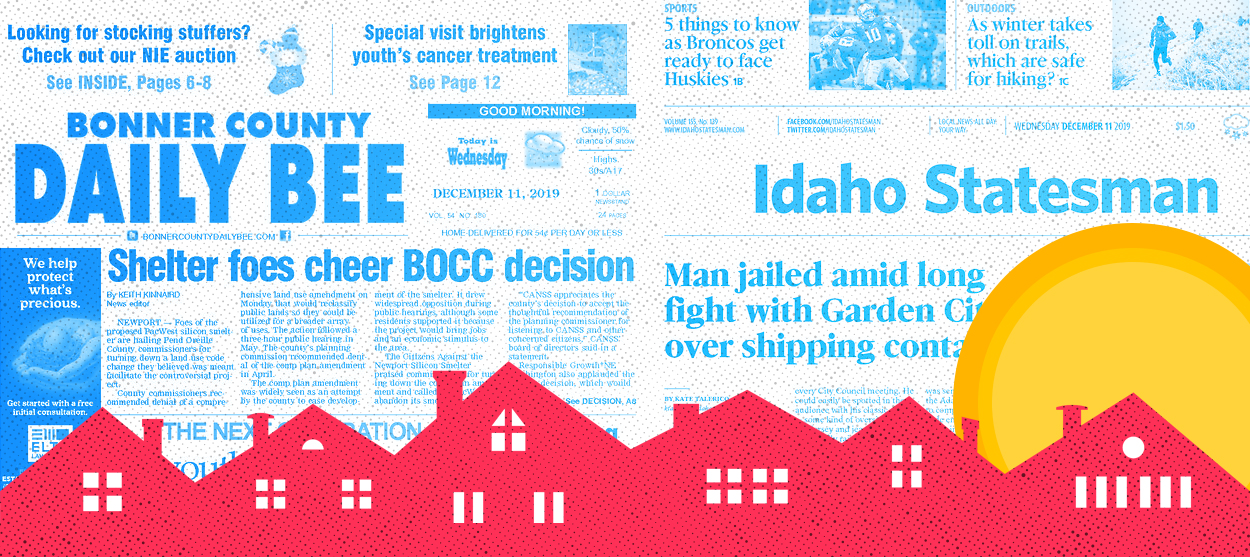Local news can save America
I mostly read local news in 2019. It completely changed my understanding of the country.


A free daily email with the biggest news stories of the day – and the best features from TheWeek.com
You are now subscribed
Your newsletter sign-up was successful
I have a confession to make: I haven't been paying very close attention to national politics this year.
This is thanks, in large part, to the fact that I've been working on a book. Whatever time I once spent following Twitter pundits and scouring second-by-second national news updates, I've devoted to reading reports on irrigation, learning more about the agricultural production of teff, investigating Transfer of Development Rights (TDR) programs, and more. If you thought it wasn't possible to nerd out over cattle grazing methods, think again.
But I also switched this year from mostly reading national news to reading more local and regional news. And as I look back on the year, I've realized how important this switch has been.
The Week
Escape your echo chamber. Get the facts behind the news, plus analysis from multiple perspectives.

Sign up for The Week's Free Newsletters
From our morning news briefing to a weekly Good News Newsletter, get the best of The Week delivered directly to your inbox.
From our morning news briefing to a weekly Good News Newsletter, get the best of The Week delivered directly to your inbox.
I don't want to denigrate the importance of national political awareness. It should be part of our regular news "diet." With another presidential election on the horizon and impeachment articles proceeding in Congress, it is important to have at least a rudimentary understanding of what's unfolding on the national political stage.
But much of our news these days is fixated on national politics: Many of us (though not all, thankfully) have a greater awareness of the latest presidential controversy than we do of the workings of the local town council. Many Americans probably have a stronger opinion of Rep. Alexandria Ocasio-Cortez (D-N.Y.) than they do of their own state delegates. And that fixation on Washington, D.C., politics can have a detrimental impact on civic involvement — drawing our attention away from the issues that most viscerally impact us, and weakening our knowledge of important community problems.
Many of the stories that flow out of Washington, D.C., are focused on partisan fights, congressional drama, and other forms of paltry political gossip that don't matter long-term. Many other national stories might focus on the abstract, the theoretical: the potentialities of various policy decisions, the imagined impact of political quagmires, and so on.
While the former often seems pointless, the latter isn't necessarily bad — but local news is the place where all this potentiality bears fruit: where zoning laws influence neighborhood development, immigration policy impacts businesses and families, and education reform shapes the lives of schoolchildren. In my own community in northern Virginia, I read about the struggles of those looking for affordable housing, the disappearance of farmland, and the efforts of local police seeking to combat our opioid crisis (among other issues).
A free daily email with the biggest news stories of the day – and the best features from TheWeek.com
In addition to all these considerations, spending the majority of our time on national news can foment political polarization: Nieman Lab found in February that when communities lose their local press, "readers turn to their political partisanship to inform their political choices." This shift impacts voting patterns at both the local and national level.
"American politics became more polarized along party lines over the past 50 years," authors Joshua P. Darr, Johanna Dunaway, and Matthew P. Hitt write. "National news focuses on that polarization and conflict, covering the partisan fights in Washington and framing politics as a game with winners and losers. In doing so, national news makes the parties seem more different and emphasizes their conflicts."
English statesman Edmund Burke once wrote that "To be attached to the subdivision, to love the little platoon we belong to in society, is the first principle (the germ as it were) of public affections. It is the first link in the series by which we proceed towards a love to our country, and to mankind."
Fixating on Washington politics upends this chain of attachments, leading to a far more atomistic view of the country — one in which our allegiances are to national political parties, not to a specific place. And that lack of local ties can, in turn, give us a skewed picture of our country: one that is focused more on drama and divisiveness than on real, practical needs. It could be, then, that greater local awareness could help salve some of the worst tendencies of our online selves — including the bombast, bitterness, and apathy that grow via polarized politics.
Sometimes local news is characterized by the same gossipy tendencies we see in our national news coverage. But more often, I've found local news to be sobering: It is where I learn about suicides, disappearances, kidnappings, abuse, and murder. It's where I'm reminded of the suffering of my neighbors, and of my responsibilities to them. This is far more important, dare I say it, than reading about Trump's latest tweets.
Local news is not all depressing and dark, though. It is also where we can read about neighborliness, outreach, voluntarism, and local stewardship. I recently read that a man in my home state of Idaho caught a record-breaking largemouth bass and a Good Samaritan renovated the home of a family in need. People finding lost pets, raising money for the sick, providing shelter to the homeless: These are the sorts of stories we often need. And we're most likely to find them at the local level.
But according to one report, 1,300 communities throughout the United States have completely lost their local news coverage. Since 2006, the newspaper workforce has fallen by 47 percent, and weekday circulation has dropped below 31 million. While some recent efforts like Report For America are seeking to keep the local press alive, there is some fear that local news is dying — and that Americans don't even care.
We should care. Because local news connects us to our neighbors, to tangible community and civic action, in a way that national news never can. It puts the darkness and joy of the human condition on full display, reminding us that we are not isolated atoms: We are part of a network, a place, that often demands something of us.
Sure, local stories are not always as flashy. But if news is meant to do more than entertain — if its purpose (perhaps even its primary purpose) is also to inform — then we need to pursue a more well-rounded media diet.
Gracy Olmstead is a writer and journalist located outside Washington, D.C. She's written for The American Conservative, National Review, The Federalist, and The Washington Times, among others.
-
 Quentin Deranque: a student’s death energizes the French far right
Quentin Deranque: a student’s death energizes the French far rightIN THE SPOTLIGHT Reactions to the violent killing of an ultra-conservative activist offer a glimpse at the culture wars roiling France ahead of next year’s elections.
-
 Secured vs. unsecured loans: how do they differ and which is better?
Secured vs. unsecured loans: how do they differ and which is better?the explainer They are distinguished by the level of risk and the inclusion of collateral
-
 ‘States that set ambitious climate targets are already feeling the tension’
‘States that set ambitious climate targets are already feeling the tension’Instant Opinion Opinion, comment and editorials of the day
